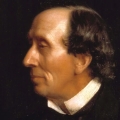
Kept secret but not forgotten - Hans Christian Andersen
Kept secret but not forgotten
A fairy tale by Hans Christian Andersen
There was once an old mansion with a moat and drawbridge. The drawbridge was more often up than down; not all visitors are good or welcome. Under the eaves were loopholes to shoot out through, and for throwing boiling water, yes, even molten lead, down on the enemy if he approached too closely. Indoors were high rafted ceilings, and this was good because of the space it provided for the large amount of smoke that rolled up from the hearth fires, where huge, damp logs burned. On the walls hung pictures of men in armor and proud ladies in heavy robes; the grandest of all the ladies was living here. She was named Mette Mogens, and she was the lady of the manor.
One evening robbers came; they killed three of her guards; along with the watchdog, and they bound Lady Mette with the dog chain in the kennel and then seated themselves in the great hall and drank the wine and all the good beer from her cellar.
Lady Mette stood chained like a dog and yet could not even bark at them.
Then the robbers' servant boy came to her; he had very quietly stolen away from them, knowing this must not be noticed, for if it were they would put him to death.
"Lady Mette Mogens," said the boy, "can you remember when my father rode the wooden horse in your husband's time? You prayed for him then, but it wasn't possible for you to help further toward freeing him; he was made to sit astride the block until he became a cripple. But you sneaked down to him, as I have done now, and you laid a little stone under each of his feet, to give him some relief. No one saw it, or perhaps they pretended not to see it, for you were the gracious young mistress of the manor. This my father has told me, and this I have kept secret but not forgotten. Now I will free you, Lady Mette Mogens!"
And then the two of them took horses from the stable and rode, through rain and wind, to get the help of friends.
"This was being well repaid for that small service to the old man," said Mette Mogens.
"Kept secret but not forgotten," said the boy.
The robbers were hanged.
There stood an old house; it still stands there, in fact - not the home of Lady Mette Mogens, but that of another noble family.
It is in our own time. The sun is shining on the gilded spires on the turrets; little wooded isles lie like bouquets on the lake, and around them swim wild swans. There are roses growing in the garden, but the lady of the house herself is the loveliest rose, bright with happiness, the happiness of good deeds, not done outwardly before the wide world, but within the hearts of people - and there kept secret but not forgotten.
Now she goes from the mansion to a little peasant cottage in the field. In it there lives a poor, paralyzed girl. A window in the little room faces the north, where the sun does not enter, and where her only view is a patch of meadow that is shut off by the high earth around a ditch. But today there is sunshine inside; God's warm, wonderful sun is there. It comes from the south through a new window where before there had been just a wall.
The paralyzed girl sits in the warm sunshine and looks out on wood and stream; her world has become so wide and so beautiful, and all at a single word from the kindly lady of the manor.
"That word was so easy, the deed so small," she says, "and the happiness it gave me was so unspeakably great and blessed."
And that is why she does so many good deeds and remembers all those in the poor homes about her and in the rich homes, too, where there also are afflicted people. Her deeds are done in secret, and kept secret, but they are not forgotten by our Lord.
There was an old house in the middle of the great, busy city. In it were halls and chambers, but we won't enter them; we'll remain in the kitchen. And here it is snug and bright; it is clean and neat. The copper utensils shine; the table is polished, and the sink is as spotless as a freshly scrubbed larding board. All this has been done by the maid-of-all-work, who has still found time to put on her own best dress, as if she were going to church. She has a bow on her cap, a black bow, which signifies mourning. Yet she has no one of her own to mourn, neither father nor mother, neither family nor lover. She is a poor, serving maid. Once she was engaged to a poor young man, and they loved each other dearly. One day he came to her.
"We two have nothing," he said, "and the rich widow across the way has expressed a warm interest in me. She wants to make me well to do, but you are in my heart. What would you advise me to do?"
"That which you think will be best for your happiness," said the girl. "Be kind and devoted to her; but remember that from the moment we part, we two must never see each other again."
A couple of years went by. Then she met him, her former friend and sweetheart, on the street. He looked ill and miserable. Then she could not keep from asking him, "How are you getting on?"
"Prosperously and well in every way," he said. "My wife is brave and good, but you are still in my heart. I have fought hard, and it will soon be over. Now we will not see each other again before we are with the Lord!"
A week has since passed. This morning it said in the newspaper that he has passed on; therefore the maid wears mourning. Her sweetheart has left a wife and three stepchildren, it said in the paper; that rings badly, and yet the metal is pure.
The black bow tells of mourning; the girl's face tells of it still more; in her heart it is kept secret but will never be forgotten.
Yes, as you see, there are three stories, three leaves on one stalk. Would you like to have more such clover leaves? There are many in the book of the heart, kept secret but not forgotten.
* * * * *
Fairy taleHans Christian Andersen
Translations:
Compare two languages:


















